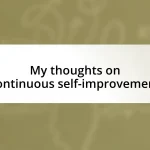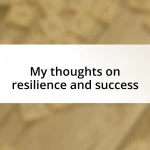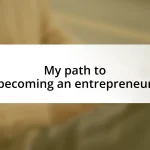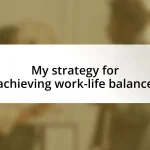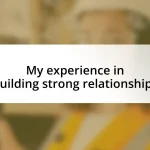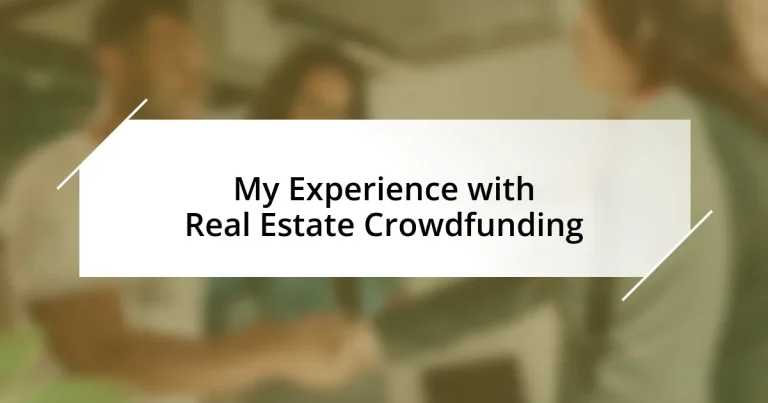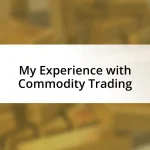Key takeaways:
- Real estate crowdfunding allows small investors to pool funds and invest in properties with low minimum investments, often starting at $500.
- Choosing the right platform involves assessing fees, project diversity, investment minimums, transparency, and user experience.
- Thorough due diligence is crucial when analyzing investment opportunities, focusing on location, expected returns, and risk assessment.
- Engaging with the real estate community and being adaptable with investment strategies enhance the crowdfunding experience and success.
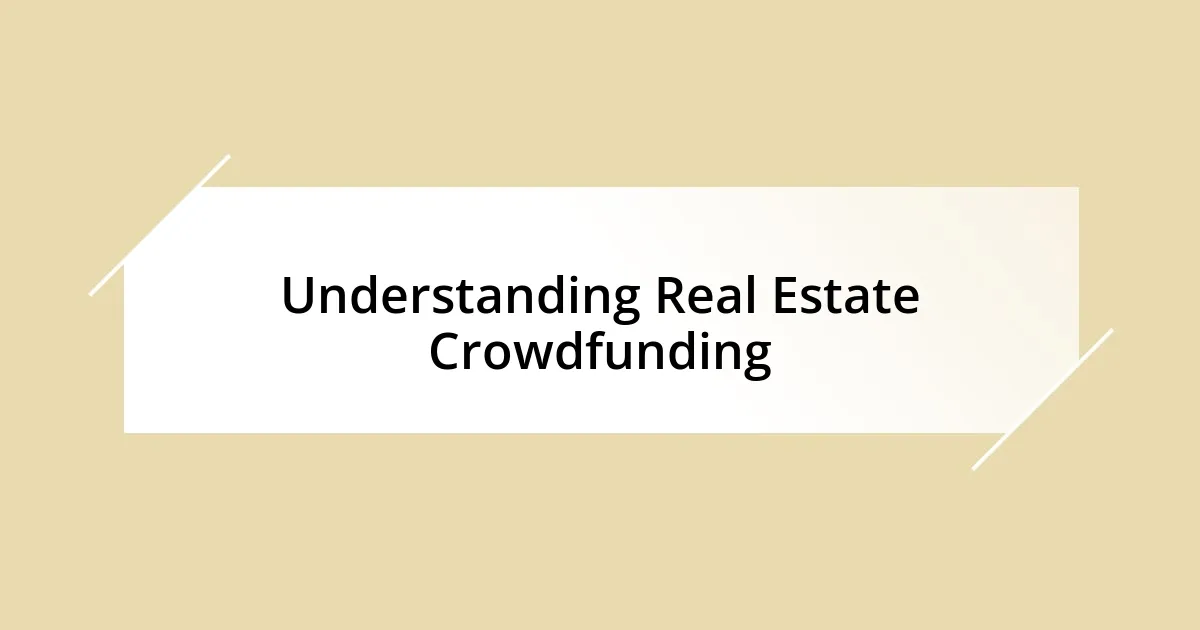
Understanding Real Estate Crowdfunding
Real estate crowdfunding is a relatively new concept that allows everyday investors to pool their money together to invest in property. I remember first hearing about it during a casual dinner with friends; the idea seemed both intriguing and a bit daunting. Could I really own a piece of a building without needing millions of dollars?
At its core, real estate crowdfunding platforms enable individuals to invest in real estate projects, often starting with surprisingly low minimum amounts. I was amazed to discover that some platforms let you start investing with as little as $500. This accessibility opened a door for me, allowing me to diversify my investments without committing a substantial amount of capital upfront.
What truly resonated with me were the stories of small investors who funded projects they were passionate about, like affordable housing developments that made a direct impact in their communities. It posed an interesting question: what if my investment could not only yield financial returns but also contribute to something bigger? This blending of profit and purpose in real estate crowdfunding changed my perception and made me consider the role I could play in shaping my community through my investments.
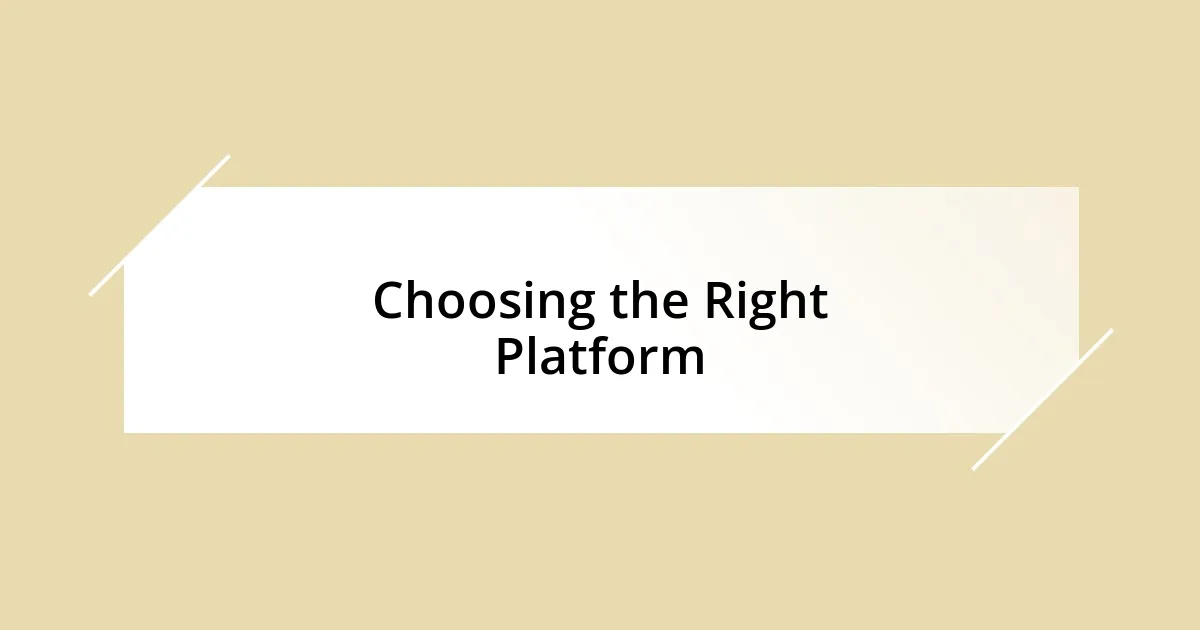
Choosing the Right Platform
When I embarked on my real estate crowdfunding journey, choosing the right platform felt overwhelming. Each platform I encountered had distinct features, offerings, and fees that influenced my decision. I remember spending countless hours comparing options, trying to decipher which would align best with my investment goals and risk tolerance.
Here’s what I found helpful in my search:
– Fees: Understand both initial and ongoing fees. Some platforms charge hefty fees that can cut into your profits.
– Project Types: Examine the variety of projects available. I preferred platforms with diverse offerings, from residential to commercial.
– Minimum Investment: Look for platforms with minimum investments that fit your budget; I appreciated having options starting as low as $500.
– Transparency: Prioritize platforms that provide clear information about projects, including risks and expected returns.
– User Experience: A user-friendly interface made tracking my investments easier, which is critical for any investor trying to juggle multiple projects.
Ultimately, it’s essential to take the time to explore and reflect on what matters most to you. The right platform should feel intuitive and trustworthy, helping you step confidently into the world of real estate investing.
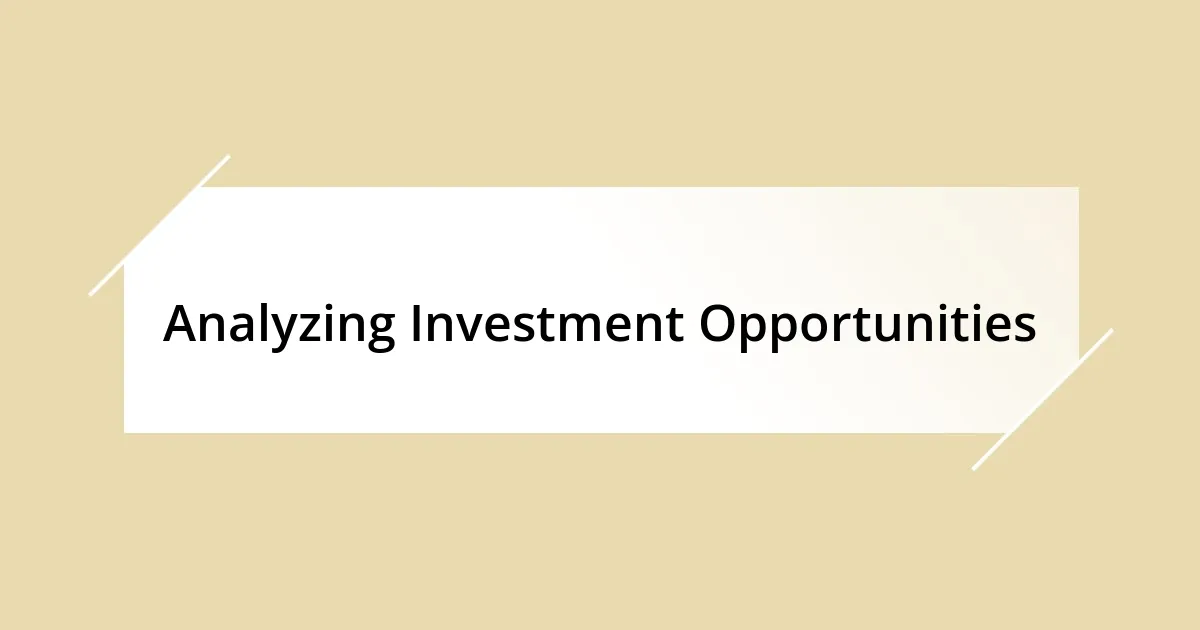
Analyzing Investment Opportunities
When it came to analyzing investment opportunities in real estate crowdfunding, I learned that thorough due diligence is paramount. I vividly remember one project that caught my eye, promising lofty projections and stunning visuals. Yet, I took a step back and examined the underlying financials, regulatory compliance, and the team’s track record. It was a relief to realize that the more cautious approach saved me from an impulsive decision that could have resulted in financial loss.
One important aspect I focused on was the location of the investment. The success of a real estate project often hinges on its geographical area. I found myself gravitating toward projects situated in neighborhoods poised for growth. One in particular, a development near a new tech hub, sparked my interest. The buzz of innovation in that area felt palpable, making me believe it could yield favorable returns.
Finally, I began comparing the expected returns versus the associated risks across various projects. This analytical approach helped me identify opportunities that aligned with my own risk tolerance. In doing so, I created a mental checklist of what I was comfortable with. This not only simplified my decision-making but also enhanced my confidence as I navigated the realm of real estate crowdfunding.
| Investment Criteria | Project A | Project B |
|---|---|---|
| Location | Urban area with high growth potential | Suburban area with low demand |
| Expected Returns | 8% annual | 4% annual |
| Team Experience | Seasoned developers with multiple successful projects | New team with no prior projects |
| Risk Level | Moderate | High |
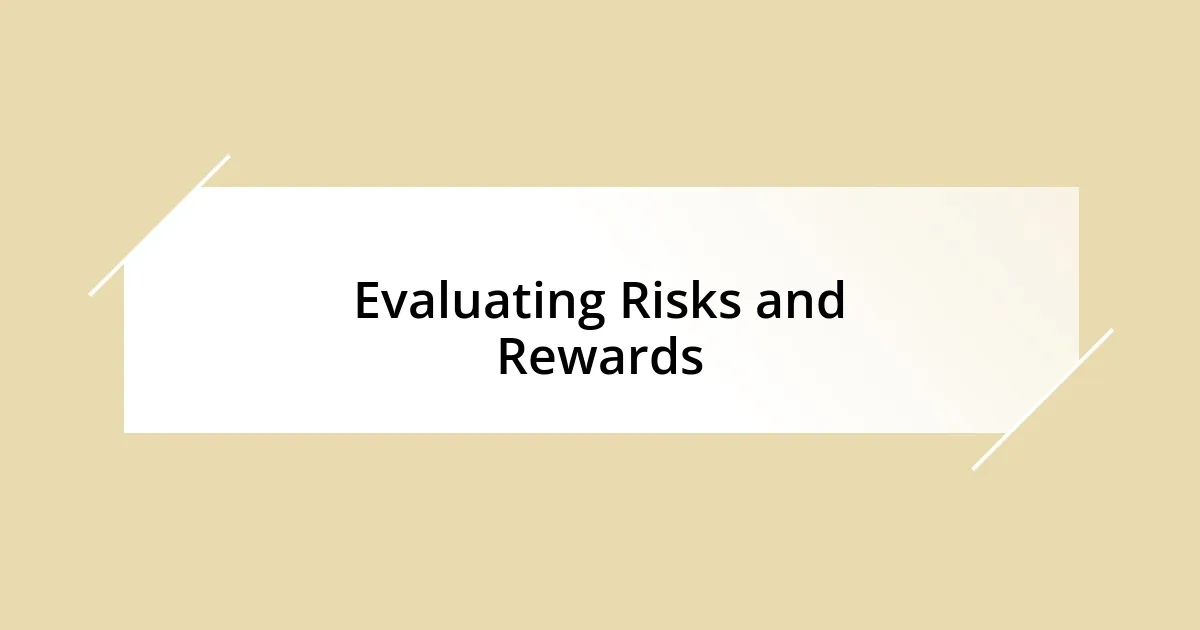
Evaluating Risks and Rewards
When diving into real estate crowdfunding, I quickly realized that understanding risks and rewards is crucial for informed decision-making. I remember a project that promised incredible returns but had underlying risks that weren’t immediately apparent. It made me wonder—are those high returns worth the potential for a significant loss? This question pushed me to analyze every aspect of the investment meticulously.
One of the most telling moments of my journey involved a project that initially excited me. The projected returns looked fantastic, but after attending a webinar, I sensed a lack of clarity around the risks. I could feel my excitement wane as I took stock of my emotions. I learned then that managing my emotional response is just as essential as the hard numbers; aligning my expectations with reality prevented me from getting swept away by hype.
Balancing the potential rewards with potential pitfalls is a tightrope walk I often engage in. For instance, I remember weighing a project with a moderate return against another that had higher returns but came with significant uncertainties. How do you measure the peace of mind that comes from a safer investment against the thrill of a riskier one? Ultimately, I discovered that making informed choices leads to empowered investing, allowing me to sleep easily at night regardless of market fluctuations.
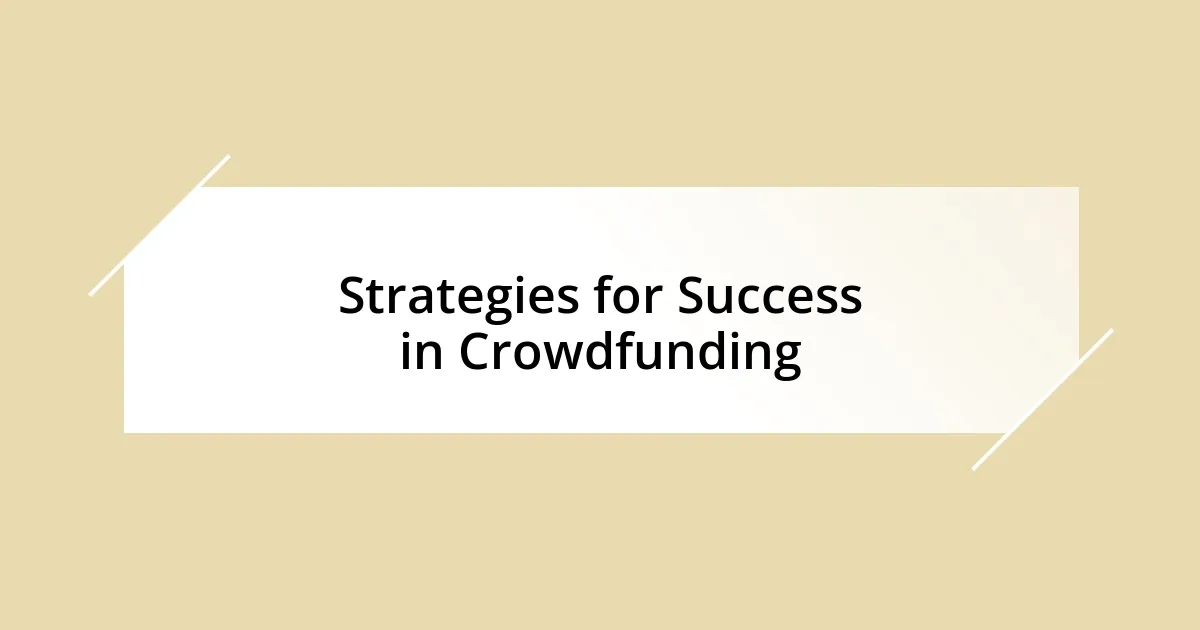
Strategies for Success in Crowdfunding
Developing a solid strategy can truly transform your experience in real estate crowdfunding. One tactic I found invaluable was diversifying my investments across different projects and locations. Initially, I was tempted to put all my eggs in one basket, focusing on that one high-potential project. However, after a heartfelt conversation with a seasoned investor, I realized how crucial it is to spread risk. This approach not only eased my anxiety but also allowed me to enjoy the thrill of various projects, each with its unique potential.
Another successful approach I learned is to stay actively engaged with projects post-investment. I remember one instance where I joined an online community of investors for a particular development. Sharing updates and insights with fellow investors kept my excitement alive and provided me with different perspectives on the project’s progress. The camaraderie built from that experience helped me stay informed and reassured, proving that being part of a community can enhance both knowledge and confidence.
Lastly, I encourage you to consistently revisit your investment goals and adjust your strategy as needed. I find that life events can shift my risk tolerance and time frame. For instance, during a crucial life transition, I reevaluated my portfolio and realized I needed to focus more on safer, income-generating projects. This introspection not only realigned my investments with my current reality but also reaffirmed the importance of flexibility in achieving long-term success in crowdfunding. It’s a continuous journey, and adapting is key!
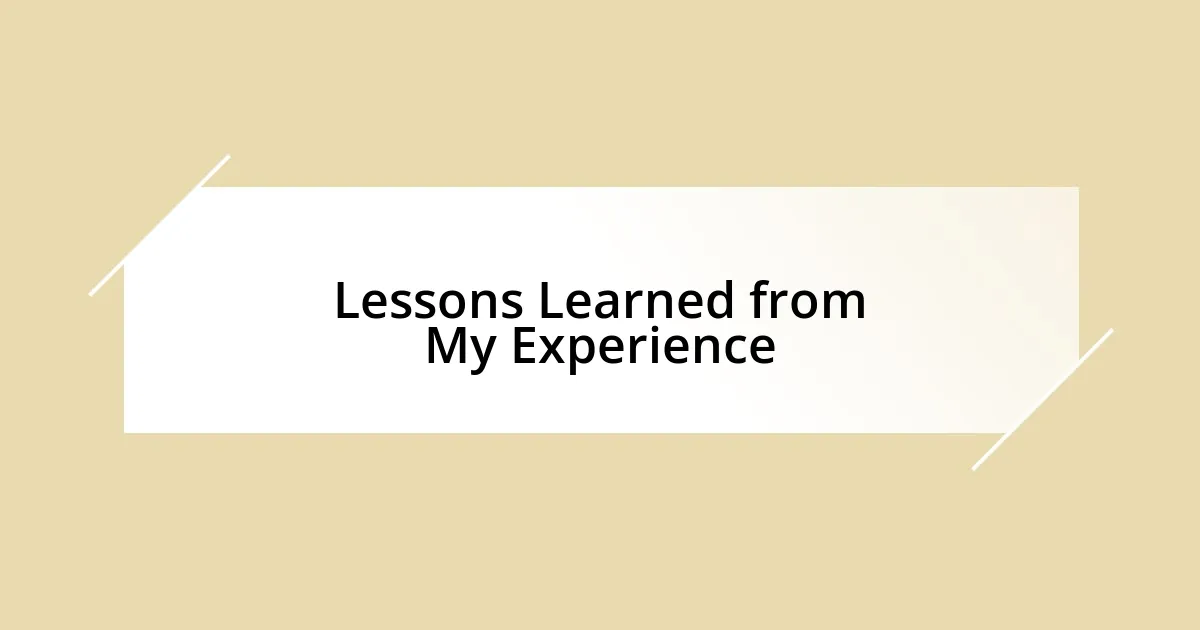
Lessons Learned from My Experience
Having navigated the world of real estate crowdfunding, I’ve learned that patience pays dividends. There was a time when I jumped into a project that seemed too good to be true. I was eager to see my investment grow quickly, but as time dragged on, I felt a mix of anxiety and frustration. It taught me that sometimes, the best thing to do is simply to wait and allow the investment to mature. Isn’t it interesting how the urge for instant gratification can cloud our judgment?
One lesson I hold dear revolves around the importance of due diligence. I recall investing in a promising property, only to find out later that there were significant zoning issues that hampered its value. I felt a stab of regret, but it also lit a fire in me to become more diligent in my research. I began asking the right questions before investing—what’s the market trend? Are there any hidden issues? This proactive approach not only shields my investments but also gives me a sense of empowerment and control.
Lastly, engaging with the real estate community has profoundly impacted my experience. I remember a networking event where a seasoned investor shared a cautionary tale about a project that went south. Hearing that firsthand instilled in me the value of community knowledge and support. Have you considered how learning from others’ experiences can shape your own decisions? For me, it’s a key reminder that I’m not alone on this journey; instead, I have an entire network to lean on, making the world of crowdfunding feel less daunting.



